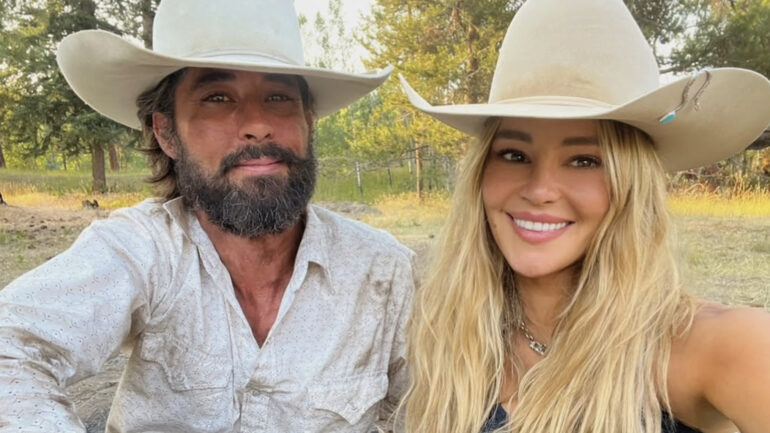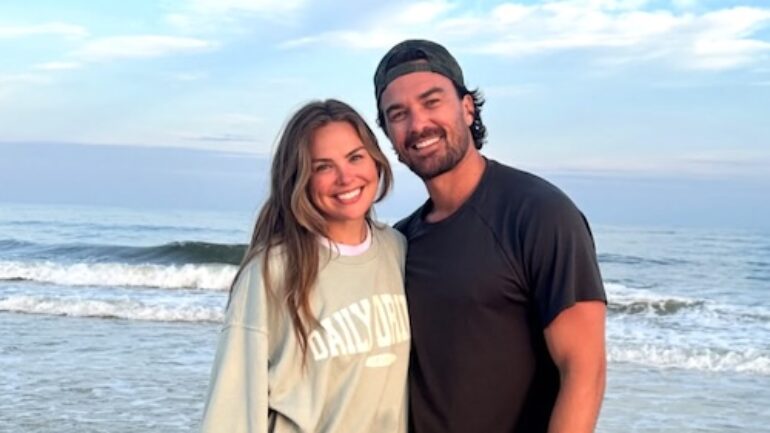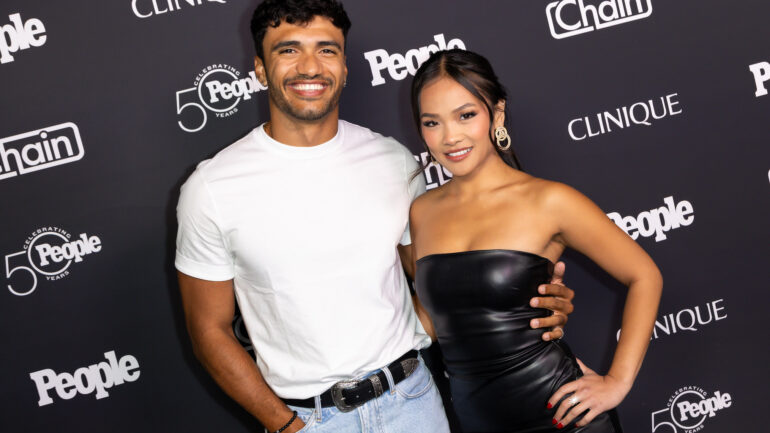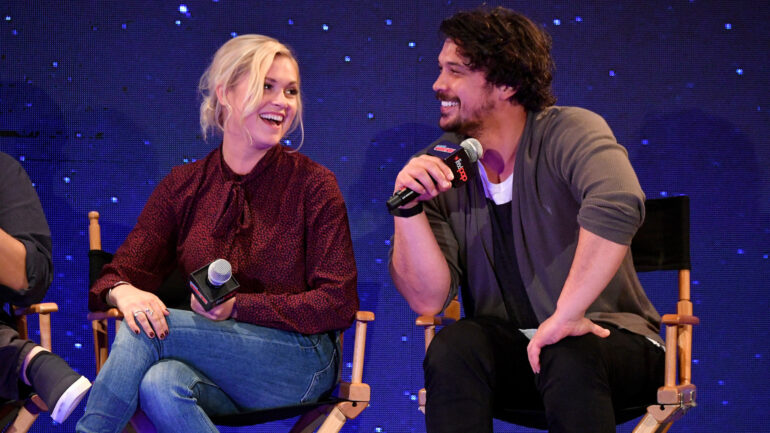‘Faking It’ Trio Honors the Trailblazing Show’s 10th Anniversary: ‘It Was a Show That People Needed’
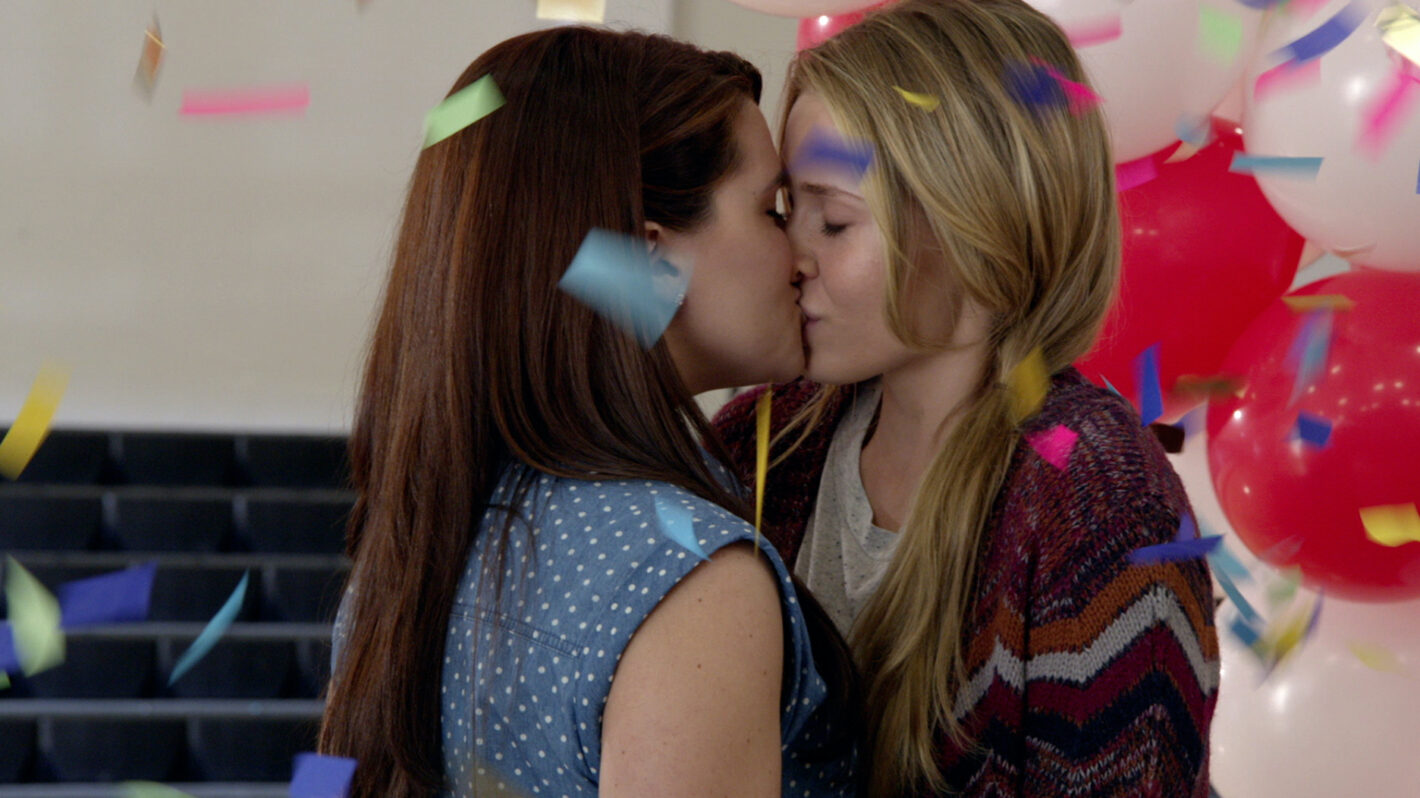
Katie Stevens, Rita Volk, and Carter Covington need a minute.
Before they can get to the task at hand, the two stars of MTV’s Faking It and their executive producer need time to catch up. As they each pop up in their respective Zoom windows, you can tell it has been a minute since they have seen each other. The smiles are uncontrollable. The laughter is already contagious. The love is real, even a decade later.
The trio hopped on a call with TV Insider to reminisce about their trailblazing series in honor of its 10th anniversary. Even they can’t believe it has been a decade.
Premiering on April 22, 2014, Faking It tells the story of Amy (Volk) and Karma (Stevens), two best friends who get mistaken for a lesbian couple in their progressive Texas high school and decide to go with it when they realize it might be the path to popularity they’ve always wanted. But as they start playing the parts, Amy realizes she might identify more with the charade than she realized –– and she might like Karma as more than just a friend.
The three-season show was a cornerstone of a renaissance for scripted programming at MTV in the mid-2010s alongside Teen Wolf and Awkward, when envelope-pushing topics baked into the familiar high school format were all the rage. But Faking It’s logline drew more controversy than most, and it came before it ever hit the screen.
“For me, it was a little scary,” Volk says. “It is always a little unnerving to be a part of something people might not get or might find offensive. I remember, I think it was right before it came out, the word going around was that we were glamorizing this very hard and serious thing people go through. It was called tacky and offensive. And my character was the one that liked a girl, so I was trying to figure out how to navigate that.”
But what stood out, once viewers watched the show, was what Covington always wanted. It wasn’t just a situational comedy about two girls piggybacking on progress for popularity. It was about two friends willing to do anything for each other.
“We talked a lot when we were making the pilot about how this is a romantic comedy about your friendship,” Covington tells Stevens and Volk. “People have to believe it, and I was so worried about that. But I was so happy MTV didn’t tell us we had to find some big name to star in this show. They told us to find the right people for the parts and that enabled you two to go through this experience together and it shows.”
Stevens and Volk met while auditioning for the same part. They were both up for Karma, the more outgoing of the pair, who really pushes Amy to go along with the fake relationship. What bonded them was just how new they were to everything about television. Volk got her start through the natural path of coming up through guest-starring roles on TV shows, while Stevens’ only big exposure prior to Faking It was a Top 10 run on American Idol in 2010.
But Idol had only taken her so far. By the time she auditioned for Faking It, Stevens says she was running out of money, working at Sprinkles Cupcakes in The Grove in Los Angeles, and hitting a wall with casting agents who couldn’t look past the singing competition on her resume.
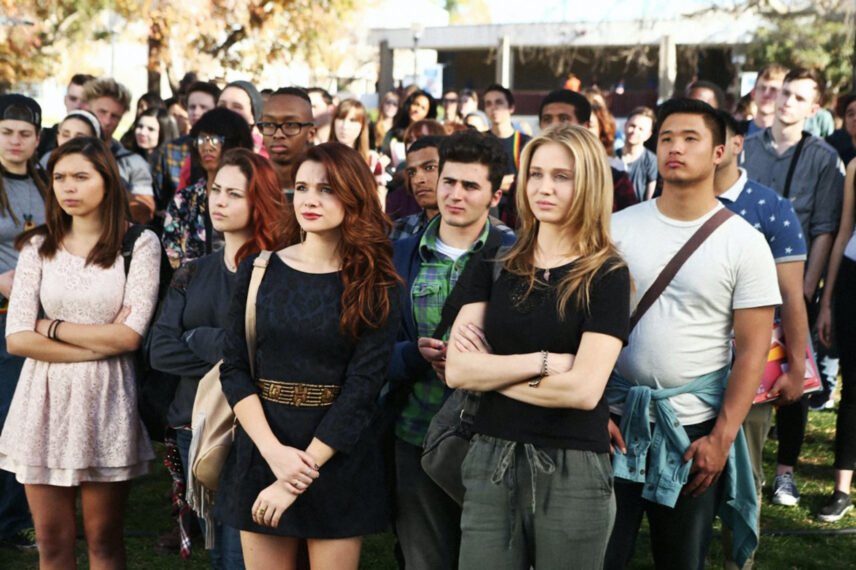
MTV / Everett Collection
“It wasn’t until my director session for Faking It that they asked me about American Idol,” she says. “It was the first time anyone had looked down, seen American Idol on my resume, and just didn’t care. They just believed in me enough to give me a chance, and that is something I will forever be grateful for.”
Covington was in that session and advanced Stevens and Volk to the network tests for Karma. It was a network executive who suggested Volk read for Amy, which finally led to them being able to audition together in their respective roles. They look back on that process now, and it’s colored by the kind of experiences and inside jokes that best friends share.
Volk cracks up at the memory of Stevens sweating through her denim jacket because she had nerves from what she still calls “American Idol PTSD.” And Stevens remembers Volk accidentally locking another actress auditioning for the role in the bathroom of the casting office, which Volk says almost certainly looked like she was trying to jeopardize her audition. (For the record, she wasn’t.)
The weeks-long process built their friendship and the love story that would become Amy and Karma — before a single shot was ever filmed.
“We became buddies through the process, and when we finally did the screen test, it was just so exciting because we had exchanged numbers by then,” Stevens says. “So afterwards, when we both found out we had gotten it, we were freaking out together. I just remember us having talks that we should hang out outside of this now. Then we did and, on my side at least, I just truly fell in love with her as a person and would not have chosen to go through this experience with anyone else.”
Carter enjoyed watching their friendship blossom from the sidelines. “I think the equality of the experience allowed them to let down their guard and really be friends, and then we were constantly talking about that friendship. Life does imitate art, and that was so fun to watch.”
By the time production got underway on the pilot, it was late 2013. Things didn’t go as planned on the first day. The first scene they shot comes near the tail end of the pilot when Karma, having dragged Amy along in her plan to be popular, goes to apologize to her friend on the roof of the high school –– a precarious spot for the height-phobic Karma. Before that scene could be shot, there was a crisis at hand.
“That first day, the head of our hair department for some reason that I don’t even remember now, did not show up for work,” Covington says. “I ended up literally flat-ironing Rita’s hair myself.”
“Oh my god, I totally forgot about this,” Volk says through laughter.
Hair was a big point of contention in the early days of the show. Covington and pilot director Jamie Travis had pitched somewhat of a throwback vibe for the tone of the show, an indie aesthetic somewhere in the realm of Pretty in Pink but not explicitly 80s. It led to bigger hair that Stevens cringes a little bit looking at today.
“I remember I had hair that almost looked like a mullet in those scenes for the homecoming and the pilot,” she says. “But that is also what I loved about it. I felt like my awkward 16-year-old self who didn’t know where she fit in in the world.”
After filming finished, the network had a few notes, two of which were: get rid of the cold open where Karma and Amy try to join a Game of Thrones club (“It was terrible,” Covington remembers) and cut the throwback indie vibe. “They said they wanted them to be gorgeous now, and I remember questioning why they were supposed to be awkward and not popular, but they are also gorgeous?” Covington says.
It meant they went back and shot a new opening, which became the final cut. This time around, they had a new hair team.
“So if you watch the opening of the pilot, they are stunning right as they roll out of bed with fake eyelashes because when we shot that, the new hair and makeup team didn’t get the memo they were supposed to match the pilot,” Covington says. “But when you get to the party scene in the pilot, it looks like a totally different show because it was what we first shot, and in the second episode they are back to being glamorous. It is the one thing that, if I could go back and change it, it would be all of that.”
Looking back, Covington is proud of what the show was able to do in its three seasons. It became widely known for being the first show to feature an intersex character, which was revealed in Season 2 to be Amy’s conservative stepsister Lauren (Bailey De Young).
There was also the matter of just how unapologetic it was about the fluidity of sexuality, with Amy and Karma sliding all over that spectrum as the series progressed. They introduced a bisexual character, they had an arc about a threesome, and they dealt with things like alcoholism. Volk constantly heard from fans telling her Amy inspired them to come out, as did Stevens. Covington still hears from people who say the show is their safe haven from intolerance in their corner of the world.
When it came to some of his more progressive pitches, Covington says he was always pleasantly surprised by how willing MTV was to go for it.
“If anything, I think they probably wanted us to take it further, but I was like, ‘Let’s make sure it is believable and grounded in the story first,’” he says. “But it was cool to be at a place that wanted to push the envelope, whereas I feel like most places didn’t.”
In the promos for the show, however, MTV led with the pilot’s climactic kiss between Karma and Amy, the moment that sealed their lie in front of the school and kickstarted Amy’s burgeoning journey of self-discovery. Stevens remembers being very nervous to shoot the kiss because she had never kissed anyone on screen before. When she recently rewatched the series with a friend who had never seen it, she says that’s the memory that came rushing back.
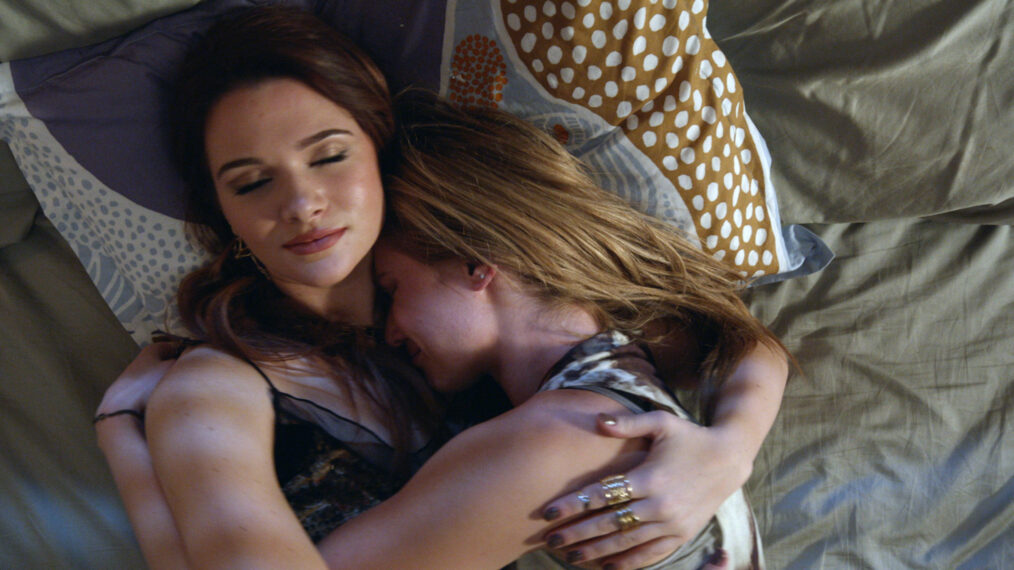
MTV / Everett Collection
“It was my first onscreen kiss, and it is the only thing that makes me cringe because I feel like my mouth was so tight,” Stevens says. “So Rita Volk, if I could do it again, I would kiss the crap out of you!”
“And they kept putting lip gloss on you,” Volk manages to say through laughter. “I was like, drowning over and over again with each take!”
Despite MTV pushing that moment to drive viewership, the trio is happy with how it turned out because it announced that Faking It wasn’t afraid to do its queer subject matter justice.
“I think times were changing, and it was a show that people needed,” Stevens says. “As an actor, once a show like that ends, you are looking for what the next thing is, and the only thing you can hope is that you do something as meaningful as that in the future again. But I don’t know if I ever will because it was so special.”
What Volk remembers most about the pilot was how uncharacteristically MTV it was.
“If it were to be redone maybe now, I think it would be in some ways grittier or darker,” she says. “But what I remember about it was kind of how innocent it was in a lot of ways, which I thought leant itself so well to the story. I just remember being shocked a little by how innocent it was at times despite us having threesomes and at one point the Tommy character wearing a suit of dildos. There was a silliness and an innocence to it. MTV is not known to be innocent, so it was like the little engine that could. That’s how I would define that episode and the early moments of the show.”
Covington had previously worked for The Trevor Project as a crisis counselor where he says he was exposed to all manner of tragedy from queer youth looking for a refuge. But he also took calls from teenagers whose problems were trouble with their boyfriends. That safe space was what he wanted to create in the show.
“When I pitched that to MTV, I was creating a fantasy school,” he says. “That sense that Hester [High School] had of being queer is being cool, I think that is very modern. I had one gay guy call who was very popular in school and I was like, ‘Woah, the whole country isn’t completely in this really dark place.’ There are spots where young people are queer and out and living their life. And I feel like there are a lot more of them now, and I think that is great. I just wish the show were more available so more people could connect with it.”
Unfortunately, he is correct. Faking It is not available to stream anywhere as of its 10th anniversary. The only way to watch it is to buy it digitally on Apple TV or Amazon Prime. The made-to-order DVD season sets are hard to find as well. A used copy of the first season now goes for upwards of $78 on Amazon.
As the show enters its next decade of existence, Covington says it is sadly at the mercy of the corporate side of Hollywood.
“It just costs money to put things on streaming platforms,” he says. “The studio would have to pay us all the residuals. They are claiming it as a loss, so if they make money from it, it complicates their accounting. I have done a lot of asking about why this isn’t available, and the moral of the story is because the business sucks.”
“I am just so happy it exists,” Stevens says. “And I hope that for those who do own it or can find it, it continues to be a warm hug when they need it.”
If or when its inaccessibility is ever rectified remains a question to which even those closest to it have no answer. But some people continue to find it. Volk admits she just received a residual check for $2. “So someone is watching!” she says.
The show was canceled in 2016 after three seasons and 38 episodes, something that still doesn’t sit well with Covington.
“I do wish we could have gotten to end it like I wanted to end it,” he says. “It still feels incomplete as a piece to me. That’s why I always have this dream of someday, I can take all these actors and characters and they’ll be 30 and they will be in New York.”
His pitch for Season 4 was to let Amy and Karma make a real go at being a couple and then realize that they were meant to just be best friends after all. Today, with the ever-changing ideas of love and relationships, he doesn’t know if that’s how he would do it.
“I wonder if it would be a little messier,” he says. “A little more like they choose each other as their life partners and negotiate everything else in the moment. I always felt like Amy and Karma were the forever team. So now thinking about making them get back to just friendship, I just don’t know. I’m like, why can’t it be friendship and…?”
As for where Stevens and Volk think Karma and Amy are now, they have some ideas. “I have always said this, I just see Amy as a documentarian making films about random stuff and traveling the world with her boots and camera equipment,” Volk says. “Just being the inquisitive soul that she is.”
“She could make that Quiet on Set documentary,” Covington says excitedly, acknowledging the recent Investigation Discovery documentary about misconduct on Nickelodeon shows.
Then Stevens jumps in: “I think Karma followed Amy to New York to do her documentaries. She’s like auditioning for Broadway shows, or at least she’s telling people she is auditioning for Broadway shows, but they are really like off off-Broadway shows.”
Now Covington gets in on daydreaming. “Well then I would have Amy do a documentary on the search for Karma’s fame and it’s so brutal that it is what Karma and Amy get famous for.” As he brainstorms in real time, Stevens and Volk nod along. “Say less,” Stevens says. “I’m in!’”

